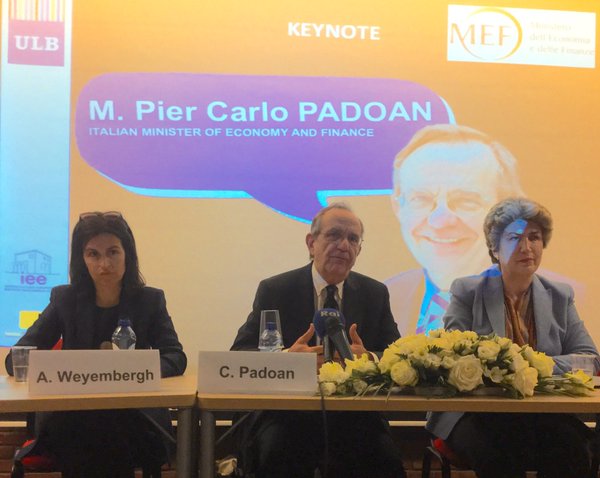
On Monday 2nd May the Institut d’études européennes (IEE) and the Solvay Brussels School Management (SBSM) of the Free University of Brussels (ULB) hosted the meeting "A Shared European Policy Strategy for Growth, Jobs, and Stability" with Pier Carlo Padoan, Italian Minister of Economy and Finance, Maria Joao Rodrigues, Member of European Parliament and Vice-Chair of the S&D Group, and André Sapir, ULB Professor and Former IEE President.
Mr Pier Carlo Padoan presented “European shared strategy for growth, stability and employment” as the Italian response to EU accusations to Italy as a country asking more #flexibility without having a logical strategy to improve its own national situation.
In a nutshell, the Italian Paper insists on the need for EU #governance reform, bearing in mind that the European project is suffering from a socio-economic and refugee crisis that forces the EU to reassess the concept of #borders. Borders cannot be walls. They have to be conceived as a system to manage flows, to provide #security and to distribute adequate standards for Citizens that struggle to perceive its added value. It is a new concept requiring big #investments. Only by sharing #sovereignity can the EU meet this challenge. European citizens should not be afraid of it.
For instance, #digital revolution and the #energy transition are important tools for the future European agenda. Both aim to create jobs. But this requires economic governance reform to avoid a collective violation of existing fiscal rules.
Another central point of the paper is the need for a “Comprehensive Policy Mix” focusing on three pillars: 1) boosting investments 2) structural reforms 3) promoting fiscal responsibility. The policy mix, being the combination of the monetary policy and the fiscal policy, not only needs to be linked to the implementation of reforms, but also has to foster investments to encourage consumer demand. The mix #investments + #reforms has to go hand in hand with a #smart innovation scheme and an effective tax collection system. For that purpose smart flexibility is crucial in order to respect fiscal policy at a European level. A further elaboration of the #monetary union is the challenge to meet as the European monetary zone cannot be sustainable on the long term in its current form.
Great importance is also given to the re-equilibration of macro-economic differences by implementing the Procedure for Macro-economic Imbalances, which has never been fully operative so far.
Finally, the Italian Paper underlines the need to re-launch infrastructure investments, working on the European Single Market to eliminate all the obstacles related to national monopolies and institutional barriers. That recalls the duty to work on a Banking Union, along with a Capital Market Union that would reduce the degree of uncertainty characterizing the European scenario at the moment. Supervision has to be crucial in order to deal with future shocks and it has to be developed through deposit and fiscal insurance. The magic ingredients have to be #solidarity between member States, common sharing and mitigation of the risks in a context where national interests currently prevail over the common good and both populism and Euroscepticism are on the rise.
A European Marshall Plan to tackle the migration issue, a road map to complete the economic and fiscal Union, and an innovation Union are all big plans. As big as the @Juncker plan for investment in Europe. Both plans need to be bigger, though. That would prevent Europe from digging the hole in which it is currently stuck even deeper.
EU Events Reporter
